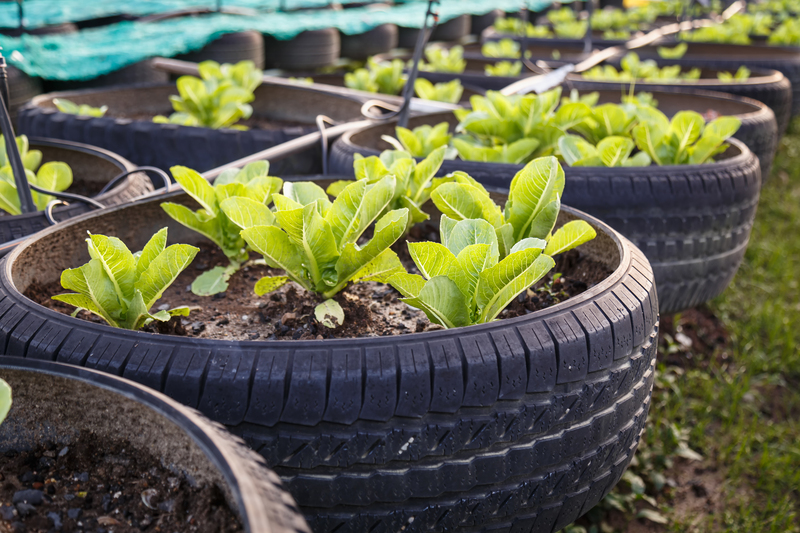Nurturing Environmentally Conscious Kids Through Recycling: A Comprehensive Guide
In today's rapidly changing world, instilling a sense of environmental responsibility in children is more crucial than ever. Parents, educators, and communities play vital roles in nurturing environmentally conscious kids and promoting sustainable habits. One of the most impactful ways to do this is through recycling education. Not only does this foster environmental stewardship, but it also encourages kids to become lifelong protectors of the planet.

Why Teach Kids About Recycling?
Recycling is more than just separating paper from plastic--it's about understanding our impact on the environment and taking proactive steps to reduce waste. Introducing children to sustainable practices at a young age not only creates environmentally conscious individuals but also builds habits that last a lifetime.
- Empowers children to make positive impacts on their community
- Reduces environmental footprint by diverting waste from landfills
- Enhances critical thinking as children learn what can be recycled and why
- Inspires families and friends to participate in sustainable actions
The Benefits of Raising Eco-Friendly Kids
Teaching kids about recycling and sustainability not only benefits the environment but also offers advantages that reach far beyond the trash bin.
- Personal Responsibility: Recycling helps children understand the direct results of their actions, fostering accountability and purpose in their everyday choices.
- Increased Knowledge: Kids who learn about recycling often become curious about other aspects of conservation, such as composting, water preservation, and responsible consumption.
- Empathy for Nature: Children exposed to green habits tend to develop a deep-seated concern for plants, animals, and their natural habitat.
- Leadership and Influence: Environmentally aware kids often inspire others to embrace eco-friendly habits, becoming role models in school and in the community.
Understanding the Fundamentals of Recycling for Kids
Before you can cultivate eco-conscious behavior in children, it's crucial to help them grasp the basics of recycling. What is recycling? Simply put, it's the process of collecting used materials and turning them into new products instead of sending them to a landfill.
How Does Recycling Help the Environment?
When we recycle, we:
- Save energy by using less power than creating new products from raw materials
- Conserve natural resources like trees, minerals, and water
- Reduce pollution in the air, water, and soil
- Reduce landfill waste, helping to protect habitats and ecosystems
Materials That Can Be Recycled
- Papers and Cardboard
- Plastics (certain types)
- Glass bottles and jars
- Metal cans (aluminum, tin)
It's important to teach that not every item can be recycled. Help children identify the recycling symbols on packaging, and make learning fun by turning it into a scavenger hunt!
Creative Ways to Foster Recycling Habits in Children
1. Set Up a Kid-Friendly Recycling Station at Home
Make recycling part of your daily routine by establishing a convenient and clearly labeled recycling area. Use colorful bins, playful signs, and let your children decorate them. This hands-on activity promotes a sense of ownership and pride in their environmental contribution.
2. Make Recycling Fun Through Games and Challenges
- Recycling races: See who can sort recyclables the fastest
- Trash art: Craft art projects from clean, discarded materials
- Recycling points: Reward children with points or small prizes for correct recycling
3. Read Environmentally Themed Books Together
Select engaging children's books about the environment and recycling, such as The Lorax by Dr. Seuss or Why Should I Recycle? by Jen Green. Reading together opens up discussions on why eco-conscious living matters and sparks curiosity about making a difference.
4. Lead by Example
Actions speak louder than words! Children are keen observers and often imitate the behaviors of their parents or teachers. When they see you consistently recycling, reducing waste, and reusing materials, they're likely to follow suit.
5. Take Field Trips to Recycling Facilities
Organize a field trip to a local recycling plant or landfill. This real-world experience demystifies the recycling process and highlights the impact waste has on our planet. Many recycling centers offer guided tours specifically designed for young learners.
6. Community Involvement and School Programs
- Participate in neighborhood cleanups
- Start a recycling or composting project at school
- Join local environmental clubs
Age-Appropriate Recycling Education
Preschoolers and Early Elementary (Ages 3-7):
- Introduce simple sorting activities with colored bins and picture labels.
- Use songs, stories, and cartoons focusing on recycling themes.
- Engage in creative reuse like building birdhouses from milk cartons.
Older Kids and Preteens (Ages 8-12):
- Teach them about the recycling process (collection, sorting, reprocessing).
- Encourage research projects on environmental impact and global waste.
- Involve them in community events such as e-waste collection drives.
Teenagers (Ages 13+):
- Discuss global sustainability goals and environmental activism.
- Encourage volunteering with local environmental organizations.
- Support initiating new recycling campaigns at school or in the neighborhood.
Overcoming Challenges in Recycling Education
It's not always easy to nurture eco-friendly habits in children. Common obstacles may include lack of awareness, limited recycling facilities, or misinformation about what can be recycled.
Common Challenges:
- Confusion over recyclable materials
- Inconsistent collection days or rules
- Resistance to change in family routines
Helpful Solutions:
- Use visual aids: Posters and simple charts for quick reference
- Regularly review local recycling guidelines: Tailor your approach to what your area accepts
- Maintain open conversations: Address questions and misconceptions openly
Going Beyond: From Recycling to a Green Lifestyle
While recycling is a fundamental step, nurturing environmentally conscious kids involves a holistic approach to green living.
- Practice reducing and reusing: Focus on buying less and repairing what you have
- Support environmentally friendly brands: Choose products with minimal packaging and made from recycled materials
- Start composting: Teach kids how organic waste can be returned to the earth
- Use sustainable transportation: Walk, bike, or use public transport whenever possible
Encourage Advocacy and Independent Thought
Invite your child to become a green ambassador in their community or school. Encourage them to speak up for eco-conscious practices, lead initiatives, or create informative presentations to educate others about recycling and sustainability.
Resources and Tools for Environmentally Conscious Parenting
Today's digital age offers a wealth of resources for parents and educators looking to nurture eco-friendly children through recycling and other green habits.
- Government and NGO websites: Offer guides, posters, and kid-friendly videos (e.g., EPA's Recycle City)
- Apps and games: Interactive tools that teach recycling skills through play
- Activity kits: Subscription boxes or DIY projects focused on sustainability
- Community programs: Workshops, cleanup events, and eco-camps

Conclusion: Planting the Seeds for a Sustainable Future
Nurturing environmentally conscious kids through recycling is a journey that begins with simple actions and grows into a lifelong commitment to sustainability. By weaving recycling education into daily life, encouraging curiosity, and fostering hands-on involvement, we equip our children to become wise, responsible stewards of our planet.
The habits and values taught today will shape the eco-friendly leaders of tomorrow. Let's work together to make recycling a natural, joyful, and impactful part of every child's upbringing. A greener future starts in our homes, our schools, and most importantly, in the hearts of our children.
Start Today: Inspire, Educate, and Empower
Whether you're a parent, teacher, or community leader, now is the perfect time to ignite the passion for recycling in the next generation. Every bottle, can, and piece of paper recycled is a step towards a cleaner, brighter world.
Frequently Asked Questions
- At what age should I start teaching my child about recycling?
Start as early as pre-school with simple sorting games. The earlier children are exposed to eco-friendly practices, the more likely they are to internalize these habits. - How can I keep my child engaged in recycling?
Turn recycling into a game, involve them in creative reuse projects, and reward positive participation with praise or eco-conscious incentives. - What should I do if recycling services are limited in my area?
Focus on reducing and reusing, advocate for local recycling programs, or seek community drop-off points for recyclable materials.
If you found this guide helpful, share it with your community and join the movement to nurture the next generation of environmentally conscious global citizens through recycling.